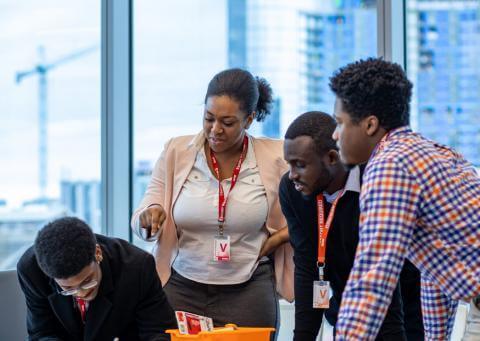Howard Team Participates in AMIE Design Challenge

Computer Science Junior Joseph Fletcher, Seniors Kendal Hall and Tyler Ramsey, and Ph.D. student Abdulhamid Adebayo participated in the Advancing Minorities’ Interest in Engineering (AMIE) Design Challenge at the Black Engineer of the Year Awards (BEYA) 2020 STEM Conference. Computer Science Associate Professor and Graduate Program Director Danda B. Rawat, Ph.D. served as their faculty advisor.
A total of fourteen teams participated in the AMIE Design Challenge. Teams were evaluated based on the desirability, feasibility, viability and presentation of their prototype. However, the real focus of the challenge was on the design thinking process, as opposed to the actual prototype or final product. According to the Hasso-Plattner Institute of Design at Stanford, the design thinking process includes a five-phase model: empathize (with users), define (problem statement), ideate, prototype, and test.
Each team had a technical advisor appointed by the team’s corporate sponsor to provide guidance during the design thinking process. Our team, or the Howard University team, was sponsored by The MITRE Corporation. Michael Long served as technical advisor to our team and Tammy Freeman served as a design challenge mentor.
Our team created a solution dubbed the Guardian App to build peace of mind for guardians of children with special needs. The application provides a monitoring service for the guardians to establish and maintain safety and security for their children while their children are outside of the home. Machine learning-based facial recognition techniques are used for the application’s monitoring capabilities of the children.
Hall explained how critical the actual problem and the design thinking and problem-solving process were for the design challenge. “We had to be able to convince the judges that the problem we presented was an actual verifiable problem,” she says. This was an easy task for Hall, as she has a nephew who was diagnosed with autism at a young age. Hall fully understood the scope of the issue that caregivers of special needs children face when their children are not with them at home.
The Guardian App automatically notifies all stakeholders, including school officials, if the child wanders outside of a certain proximity from where they are supposed to be located. Our team was able to design within the app the capability for emergency services (EMS) to be automatically notified when the child wanders. Also helpful to EMS personnel is the database accessible to them through the app which holds pertinent medical information on the child. The team also worked to ensure that Health Insurance Portability and Accountability Act (HIPAA) regulations were followed to keep the data safe.
As for teamwork and working through the challenge, Fletcher comments, “My teammates definitely made the entire process a lot easier and more fun. We were always there for each other. Our adaptation skills also flourished, as we learned how to deal with new challenges and address them a day at a time. Teamwork is everything.”
And their best advice?
“Don’t procrastinate. Design for your users, not for yourself,” says Ramsey, “and don’t be afraid to think out of the box.”
(Pictured: Howard University Team (clockwise): Joseph Fletcher, Kendal Hall, Abdulhamid Adebayo, and Tyler Ramsey)
